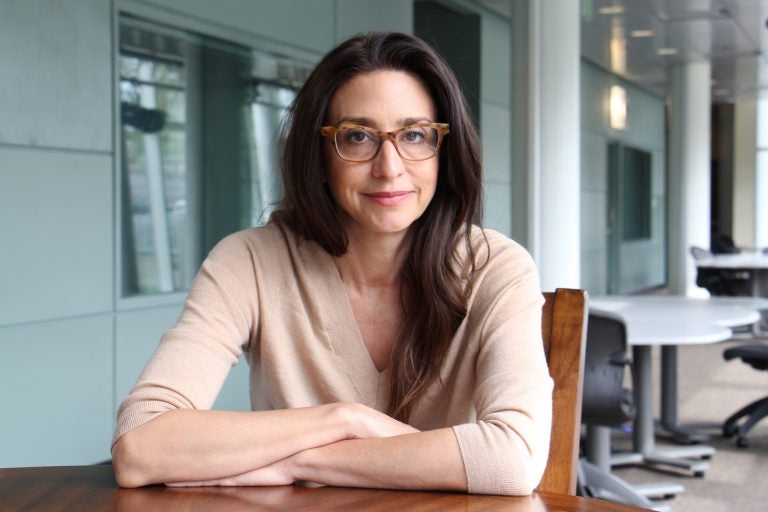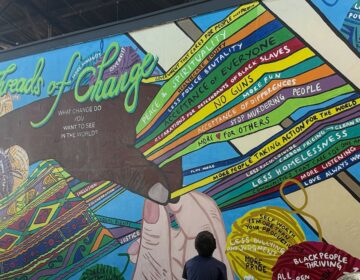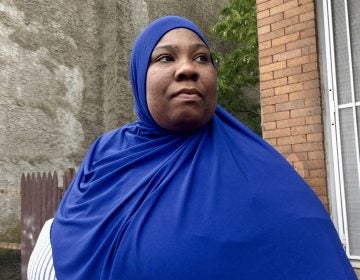The woman behind the viral video of Philly Starbucks arrests
Philadelphia writer Melissa DePino wanted to stand up as a witness to the racial bias she observed at a Philadelphia Starbucks.
Listen 7:39
Melissa DePino, who shared the video of two black men being arrested at a Rittenhouse Square Starbucks, comes to WHYY to talk about the experience. (Emma Lee/WHYY)
When police arrested two black men at the Starbucks near Philadelphia’s Rittenhouse Square nearly two weeks ago, bystanders documented the incident with smartphone videos. One, in particular, went viral on Twitter.
Philadelphia writer Melissa DePino posted a video of Rashon Nelson and Donte Robinson just after Philadelphia police arrested them for refusing to leave the store when an employee denied them access to the restroom. Nelson and Robinson had not purchased anything and were waiting for a friend.
In an interview with WHYY’s Morning Edition host Jennifer Lynn, DePino says their only crime was being black in an America rife with racial bias.
You can listen to their interview, edited slightly for time, above. The entire transcript of their conversation follows.
You saw Rashon Nelson and Donte Robinson arrested in the Starbucks. You did not videotape the arrests. Who did?
There were a few people who videotaped the arrests. There was a woman sitting next to me videotaping, and there were a couple others also videotaping that day.
Who was the person?
The woman next to me was named Lauren. She shared the video with me right after she took it.
You’re the one who posted it on Twitter. In a piece you wrote for CNN.com, you said you did it because it felt like the right thing to do. Was there ever a question in your mind to post it, or not post it?
Honestly, I didn’t even think about it. It just felt like the right impulse right in the moment, and that’s what I did. There wasn’t a lot of thought behind it truthfully.
You said at first you didn’t think the video would draw much attention. Why?
Well, I think, or I know, that these things happen every day. Things that are dramatic and painful reminders of racism in this country today. Things dramatic and things not dramatic. Things that are smaller, quieter indignities. I feel like they don’t get the attention they deserve. I do wonder, was this shared so widely because it was by someone who looks like me?
Before we are speaking now, we spoke a few days ago and you said – well, here you are firmly in the center of a national conversation about race — and you said you have to stay in your lane. What do you mean by that?
What I mean by that is, as a white person, I have never experienced anything like what those gentlemen experienced or what any other people of color in this country experience every day that is a result of racism. So I can’t possibly speak to what that feels like, because I have privilege that protects me from that. So, what I feel would be the best thing is that people who don’t experience it listen and seek out and amplify the voices of people who are actually experiencing it. Because, I’m not the one to explain it. I’m just the one to spark the conversation. Hopefully there are others like me who are willing to continue to spark the conversation.
There’s plenty going on your Twitter. I see you as this kind of curator of the conversation on Twitter. You’re hearing from supporters, and I’m sure you’re hearing from haters. I even saw comedian Wanda Sykes posted, ‘We need to close the country for racial bias training.’ Slate.com said something like, ‘In America, blackness means you’re a problem, not a customer.’ You responded, ‘Yes.’
Right, there are so many pieces to this. I, even having experienced this, and all the things that I have learned since then, I can’t speak on with any authority. I did see that Wanda Sykes tweet, and I did retweet it because I see it as a way of amplifying the voice of someone who knows better than I do. So, that’s the tactic that I’ve been
trying to take.
You’ve also written that you had a well-meaning friend say to you that she was shocked by the video, didn’t think these things still happened. You said you think because the video was posted by someone she trusted — you — it sent a different message to her. Describe that.
I’ve been saying that I’m not an authority on much except for being a middle-aged, upper-middle-class white woman who is interested in social justice and racial justice in the country. I am trying to be curious about it. I really firmly believe that there are so many in my generation that do hold these unconscious or conscious biases that they don’t look at and they don’t think about and they don’t consider. These are well-meaning friends, and I’m certainly well-meaning, but I don’t know the extent of how deep my biases go. I think looking at that is the most important thing that we can do and listening to people who know better.
There are even segregated social media places that we are on that we don’t even think about. Who are our followers? What are we conversing about on Twitter?
I’m not going to quote this very well, but there were a couple of different studies that came out in 2016 — one was by Pew and the other one was by PRRI (Public Religion Research Institute), I believe, that talked about how essentially — and I’m paraphrasing — that our social media networks are very segregated, No. 1. Most white social media users, their networks are made up of mostly white social media users. The next step of that, in my mind, is this idea that on social media, white users aren’t talking about race. So, there are sort of two pieces to that. My having posted this — and I hope it went to a lot of white users — I hope that people in my social network and people in my circle of influence will then also share these things. Honestly, another complication to it is not just share things like these men being humiliated in front of the 10 million, 12 million who saw it, but things that are everyday indication of where we are in this country with racism. There is some criticism about we have to
see something this dramatic and we have to humiliate these people in the public eye in order to pay attention.
Have you spoken to Rashon Nelson and Donte Robinson?
I have not, but I really admire what they did that day. They were so calm.
They were so calm and the situation did not escalate. What if this video was never posted? You said some others (videos) were taken.
I don’t know. I’m glad in many ways that I did post it because I do feel that it sparked a conversation particularly among a lot more white Americans. I hope that’s what it did. Given those statistics I mentioned, I’m not quite sure it did, but I hope that it did. The fact of the matter is that black and brown people have been posting these things all the time and not just dramatic events like this, and white America doesn’t seem to be listening. So, it’s become evident to me that we need to sort of bridge this gap when we can, and we need to pay attention.
Say something when you see something has become a mantra, for a lack of a better way to describe it, following this incident. Has the Starbucks manager been tried in the court of public opinion? I mean, we have not heard her response to the response to all of this. I’m wondering did she fail to consider how risky it is to call police on black males in this country?
Well, of course she failed, but it was likely a result of a deep bias that many white Americans hold and don’t look at. She likely had no idea how dangerous it is to call the police on black men, but that’s because of that communication divide, in my view. And the idea of us sort of looking at our privilege in a really honest way and feeling vulnerable and feeling uncomfortable and understanding how we can contribute to this productively as oppose to unproductively.
Some people see you as a hero for posting this video. Are you a hero?
Oh, my goodness. No, not at all. I appreciate everyone’s thanks. I did receive a lot of thanks for posting this, but the truth of the matter is, all I did was do what you should do. When you see something like this you expose it, and then you open the conversation to those who can speak about it better and in more of an educated way than you can. Because, as I said, I’m no expert at this at all. All I did was act as a witness, and if you want to talk about the lane we need to be in, I think that’s the lane we need to be in.
Thank you very much for your time.
Thank you so much, Jennifer.
WHYY is your source for fact-based, in-depth journalism and information. As a nonprofit organization, we rely on financial support from readers like you. Please give today.





